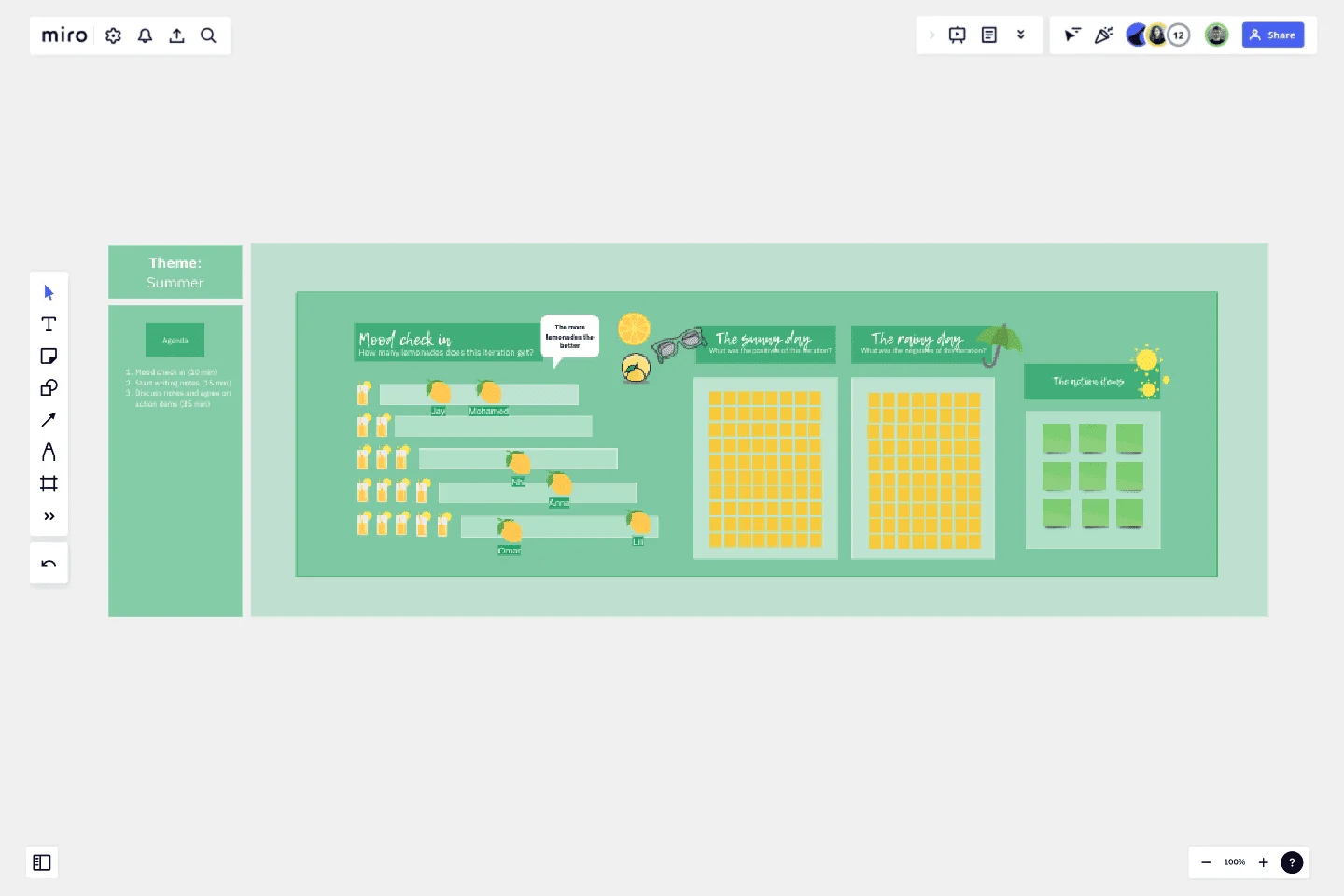Retrospective - Summer
Summer themed retrospective board.
Here's to another fun retrospective board.
This time with the theme 'Summer'
What you will find in this retrospective board:
• A lemonade mood check in
• An area to write notes and action items
Recommended timebox: 1 hour (but the session can easily be adjusted for longer/shorter sessions)[Tips and more instructions are added into the template.]
Happy retrospective-ing!
Template created by Nhi Tran.
Explore all Miro's capabilities for online retrospectives and run more engaging and inclusive retros.
Get started with this template right now.
Presentation Template
Works best for:
Presentations, Education
At some point during your career, you’ll probably have to give a presentation. Presentations typically involve speaking alongside an accompanying slide deck that contains visuals, texts, and graphics to illustrate your topic. Take the stress out of presentation planning by using this presentation template to easily create effective, visually appealing slides. The presentation template can take the pressure off by helping your audience stay focused and engaged. Using simple tools, customize a slide deck, share slides with your team, get feedback, and collaborate.
Sailboat Template
Works best for:
Agile Methodology, Meetings, Retrospectives
The Sailboat Retrospective is a low-pressure way for teams to reflect on how they handled a project. By defining your risks (the rocks), delaying issues (anchors), helping teams (wind), and the goal (land), you’ll be able to work out what you’re doing well and what you need to improve on for the next sprint. Approaching team dynamics with a sailboat metaphor helps everyone describe where they want to go together by figuring out what slows them down and what helps them reach their future goals.
Starfish Retrospective
Works best for:
Retrospectives, Agile Methodology, Meetings
The Starfish Retrospective template offers a structured approach to retrospectives using the metaphor of a starfish. It provides elements for identifying what to start, stop, continue, do more of, and do less of. This template enables teams to reflect on past iterations, identify actionable insights, and prioritize improvements. By promoting clarity and focus, the Starfish Retrospective empowers teams to drive meaningful change and continuous improvement effectively.
SAFe PI Planning
Works best for:
Agile
SAFe PI Planning is a collaborative event for Agile Release Trains to plan and align on program increments. It provides a structured framework for setting objectives, identifying dependencies, and sequencing work. This template facilitates PI Planning sessions, enabling teams to visualize their commitments and coordinate cross-team dependencies effectively. By promoting transparency and alignment, SAFe PI Planning empowers Agile organizations to deliver value at scale with predictability and quality.
Retrospective by Axelle Vanquaillie
Works best for:
Retrospectives, Agile Methodology
The Retrospective template facilitates team reflection and continuous improvement by providing a structured framework for evaluating past iterations or projects. It encourages open communication, identifies successes, challenges, and action items, fostering a culture of learning and collaboration. Team members can share feedback, insights, and suggestions, enabling them to celebrate achievements, address issues, and implement positive changes in future endeavors.
Christmas Retrospective
Works best for:
Agile Methodology, Meetings, Retrospectives
The Christmas Retrospective template offers a festive and celebratory approach to retrospectives, incorporating the holiday spirit into the session. It provides elements for reflecting on achievements, sharing gratitude, and setting intentions for the future. This template fosters a sense of warmth, togetherness, and appreciation among team members, encouraging reflection on both professional and personal growth. By infusing the retrospective with the joy of the holiday season, the Christmas Retrospective empowers teams to strengthen relationships, cultivate positivity, and drive continuous improvement effectively.
